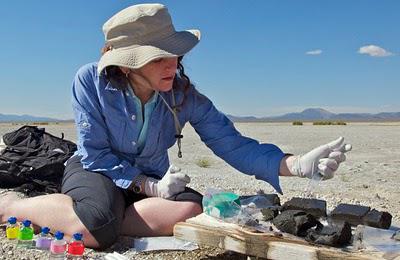
An unspoken but widely held belief among both evolutionary biologists (and some "intelligent design" supporters) is the idea that life (or, to be more specific, living organisms and/or metabolic processes) originated once a very long time ago. Along with my fellow biology majors, I was taught this by William T. Keeton in introductory biology at Cornell, where we also were told that if life (or biomolecules) somehow spontaneously started again today, it would immediately be scarfed up by already living organisms.
This idea ultimately derives from the last paragraph of Darwin's Origin of Species, in which he proposed that
"There is grandeur in this view of life, with its several powers, having been originally breathed into a few forms or into one; and that, whilst this planet has gone cycling on according to the fixed law of gravity, from so simple a beginning endless forms most beautiful and most wonderful have been, and are being, evolved." [Origin of Species, 1st edition, 1859]Darwin asserted this partly to contrast his theory of evolution from that of Lamarck's, which included the idea that life was continuously arising spontaneously, generating new phylogenetic lines of organisms throughout deep evolutionary time. The discovery of the (almost) "universal" genetic code in the 1950s by Crick, Nirenberg, Holley, Khorana, et al provided strong evidence for the "one origin" hypothesis.
However, the fact that there is currently no evidence for an alternative "many origins" hypothesis doesn't necessarily support the conclusion that this hypothesis has been falsified. On the contrary, as the recent discovery by Felisa Wolfe-Simon of a "shadow arsenic metabolism" indicates, this lack of evidence is the result of lack of investigation, rather than actual lack of such origins. It is, in other words, quite possible that life (or at least biochemical processes similar to metabolic processes and molecules similar to "standard" biomolecules, and even cell-like structures incorporating both) is "originating" spontaneously all the time, but that we haven't noticed it because we haven't been looking. After all, nobody suspected the existence of an entire domain of living organisms (i.e. the Archaea) until Carl Woese starting looking two decades ago.
As J. B. S. Haldane — who formulated an early hypothesis for the origin of life — once quipped,
"[T]he Universe is not only queerer than we suppose, but queerer than we can suppose." [Haldane, J. B. S. (1927) Possible Worlds and Other Papers, page 227]************************************************
As always, comments, criticisms, and suggestions are warmly welcomed!
--Allen
